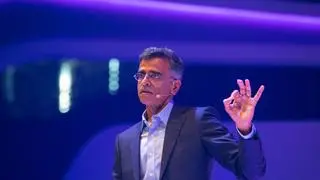As Artificial Intelligence (AI) and Generative Artificial Intelligence (Gen AI) are ruling the IT industry, top IT vendors are investing huge amounts in the sector and also ensuring that employees are skilled in the domain rather than looking outside for skilled personnel. Wipro is investing $1 billion in AI in the next 3 years, while Cognizant will invest $1 billion in three years in Gen AI.
IT vendors are also skilling their employees in both AI and Gen AI. TCS has trained over one lakh in Gen AI and Wipro nearly 2.80 lakh on Gen AI general principles. Cognizant has trained about 55,000 of its employees in Gen AI this year, and has an additional 40,000 employees from all levels of the company registered in pursuing training on Gen AI.
The companies are making the investment and training employees because clients globally are looking to adopt AI and Gen AI in a big way. Gen AI is part of every conversation with the clients, Thierry Delaporte, CEO, and Managing Director, Wipro, told analysts recently.
In July, Wipro, while launching Wipro ai360, an AI-first innovation ecosystem, committed to make a $1-billion investment in advancing AI capabilities over the next three years.
A month later, Cognizant’s CEO S Ravi Kumar said the company expects to invest approximately $1 billion in Gen AI capabilities over the next three years. “The number of projects we have underway focussed on cognitive and generative AI, we see this technology generating a new wave of opportunities for us,” he said.
The main difference between AI and Generative AI lies in their capabilities. While AI is limited to analysing existing data, Gen AI generates new content from the patterns it has learned. The global AI market valued at $136.55 billion in 2022 is projected to expand at 37.3 per cent from 2023 to 2030, says Grand View Research. Similarly, the global Gen AI market size is projected to grow from $43.87 billion in 2023 to $667.96 billion by 2030, says Fortune Business Insights.
Skilling employees is critical. Year to date, Tata Consultancy Services has logged 26.4 million learning hours and acquired 2.6 million competencies, including over 350,000 high demand competencies. “We have over 100,000 Gen AI ready employees today and we are now investing in deepening their expertise further on this exciting new technology,” Milind Lakkad, Chief HR Officer, TCS, told analysts while discussing the company’s second quarter financial results.
Salil Parekh, CEO Managing Director, Infosys, said: “We continue to make investments in Generative AI as we look to help our clients navigate the way forward with deep capability. We have trained 57,000 employees in Generative AI.”
Wipro has trained 180,000 employees in basic Gen AI general principles, said its CEO Delaporte. “We are seeing a doubling of GenAI active projects than we did just one quarter ago. For now, we are seeing rapid adoption in healthcare, consumer and financial services, but also in hi tech and utilities,” he told analysts.
- Also read: Can AI take over the roles of actors?
Krishna Vij, Business Head – IT Staffing, TeamLease Digital Pvt Ltd, a HR firm, on how IT vendors are responding to the current demand for Gen AI, said major IT players have collectively trained nearly seven lakh employees in collaboration with tech giants such as Google, AWS, Microsoft, Oracle, and NVIDIA.
India, being one of the largest providers of AI talent and a growing market for Gen AI solutions, is expected to generate over 300,000 Gen AI-related jobs by 2025. This has created a demand-supply gap for Gen AI skills, prompting significant investments in training by IT majors. The demand for Gen AI solutions is growing rapidly, and IT companies are well-positioned to capitalise on this opportunity, attract and retain top talent, she said.
Despite an overall slowdown in IT deal flow, interest in AI remains high. Most investments are directed towards foundation models, acting as catalysts for advancements in applications, machine learning operations, infrastructure, and vertically integrated models. This surge is fuelled by the increasing demand for customised content and AI interventions in business management, she said.








Comments
Comments have to be in English, and in full sentences. They cannot be abusive or personal. Please abide by our community guidelines for posting your comments.
We have migrated to a new commenting platform. If you are already a registered user of TheHindu Businessline and logged in, you may continue to engage with our articles. If you do not have an account please register and login to post comments. Users can access their older comments by logging into their accounts on Vuukle.